2025 P4G Vietnam Summit

About
2025 P4G Vietnam SUMMIT
Global Partnership for Green Sustainability: Inclusion. Innovation. Responsible Actions.
The 2025 P4G Vietnam Summit will bring together global leaders, experts and influential stakeholders from businesses and civil society to share insights, showcase innovations and develop actionable strategies that support innovation and entrepreneurship, accelerate global climate finance and deliver country level climate transitions. The P4G Vietnam Summit is tentatively scheduled for April 14 – 17 in Hanoi, Vietnam.
Positioned strategically between COP29 – ‘The Finance COP’ – and COP30 in Belem, the P4G Vietnam Summit will provide global leaders with the latest insights from the entrepreneurs and investors who are driving global financial commitments into real investments in nationally aligned and locally based climate ventures. With a focus on practical solutions and transformative partnerships, P4G’s fourth biennial summit will serve as a catalyst for environmental and economic progress.
Gathering the world’s leaders in innovative finance and featuring P4G climate startup companies and global climate businesses, the Vietnam Summit will create opportunities to rapidly advance and scale financeable models for on-the-ground climate solutions.
Keep checking back for more updates on the Summit location, program and speakers.
2023 P4G Colombia Summit Communique
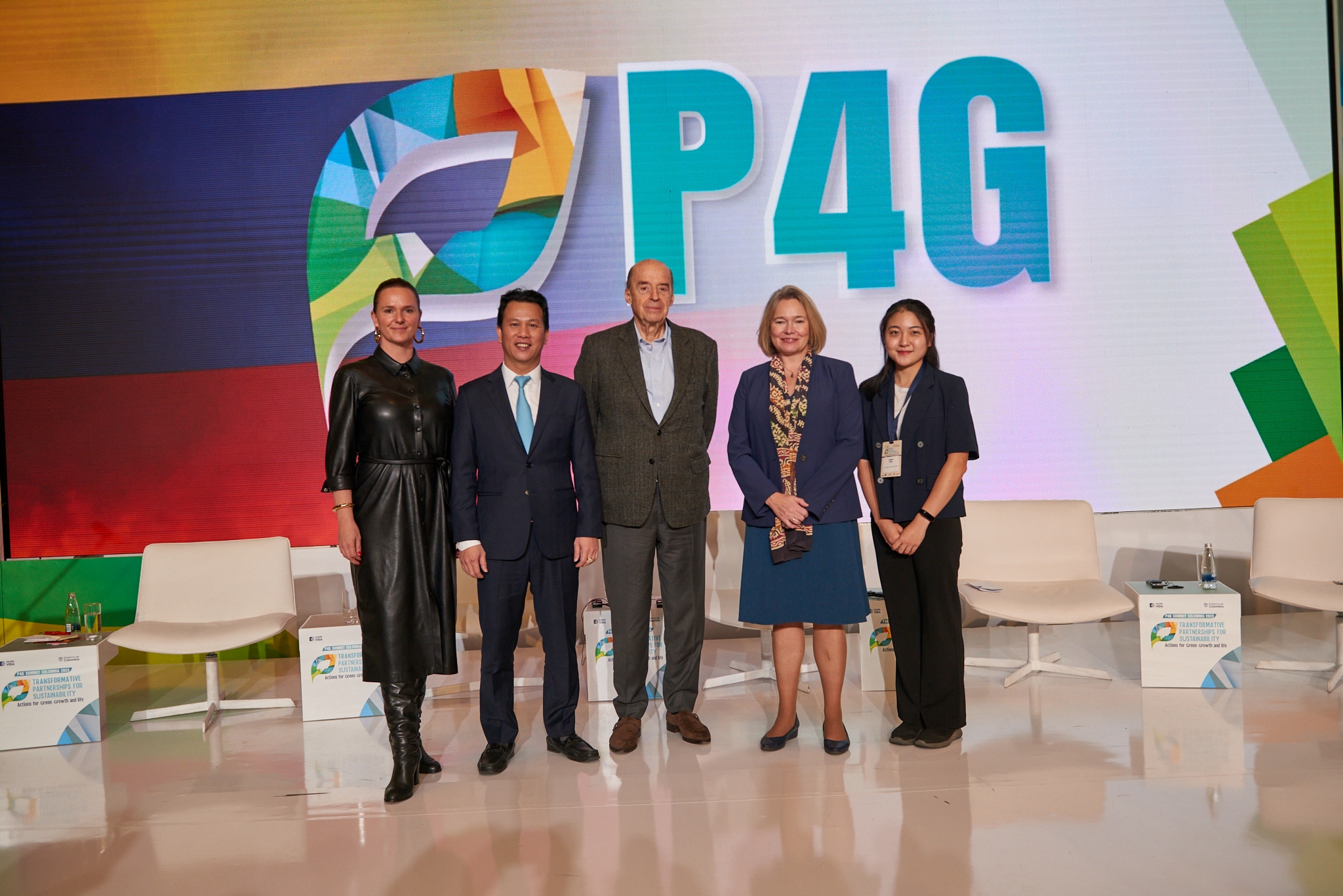
2023 P4G Colombia Summit Recap
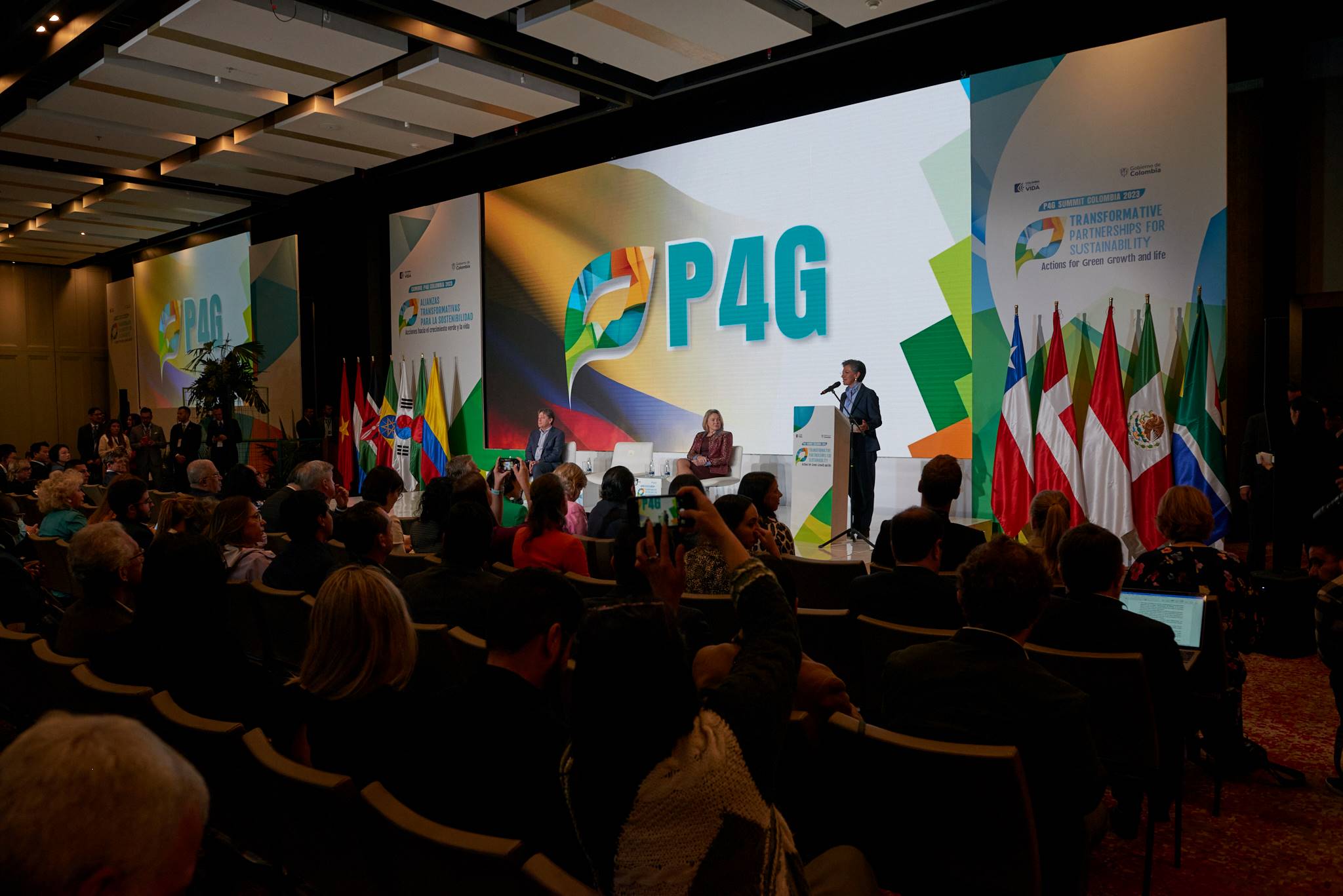
Subject
P4G Summit
External article
Read MoreCountry
Bangladesh, Republic of Colombia, Denmark, Ethiopia, Vietnam, Indonesia, South Africa, Kenya, The Republic of Korea, Netherlands, United Mexican States (Mexico)
Publication Date
2023-10-06
2023 P4G Colombia Summit Accelerates Climate Solutions
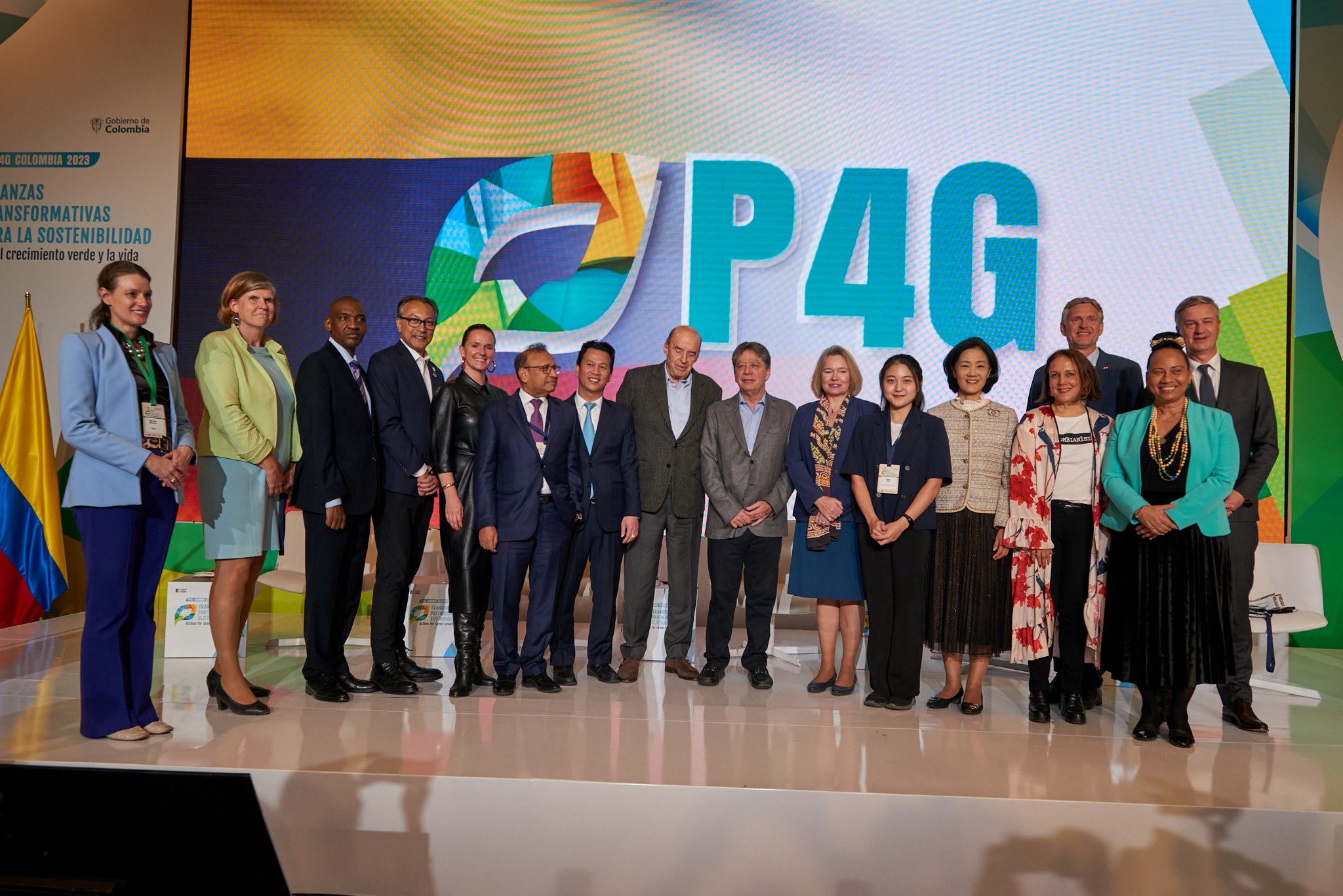
Subject
P4G Summit
Publication Date
2023-10-05
About
The 2023 P4G Colombia Summit brought together more than 1,100 government leaders, CEOs, entrepreneurs, NGOs and investors from more than 24 countries to accelerate climate finance for just transitions. With more than 23 sessions, the summit helped businesses access financing and overcome policy barriers. Hosted by the Government of Colombia, City of Bogotá and the National Business Association of Colombia (ANDI) in Bogotá, Colombia on September 22-23, 2023, the Summit covered climate finance challenges and solutions across three main tracks: biodiversity, energy transition and sustainable cities.
P4G contributes to green and inclusive growth in low- and middle-income countries by helping locally led climate businesses become investment ready. It works alongside national level public-private platforms and global leaders to improve market systems for in-country climate transitions, while also accelerating green entrepreneurs’ journey to commercial investment readiness. By doing so, P4G helps to increase the flow of global climate finance to local climate solutions to enable in-country climate transitions.
The need for a just transition echoed throughout the summit sessions. Bogotá Mayor Claudia Lopez opened the summit by emphasizing the value of community-led public-private partnerships to ensure social inclusion, quality education and good jobs are part of the climate response. Shameela Soobramoney, CEO of South Africa’s National Business Initiative, underscored that the just transition must center people by making sure resources are adequately distributed, and that in South Africa, businesses are pioneering ways to make that happen.
Framing the summit’s focus on implementation, Robyn McGuckin, Executive Director of P4G shared the initiative’s approach to supporting climate businesses in low- and middle-income countries with funding, technical assistance and enabling systems support so they can become financially viable and scale their impact. Bruce Mac Master, CEO of ANDI, reinforced the need for urgent action, with public-private partnerships as an essential component of implementing the solutions needed at the speed required.
Officials from the governments of Denmark, the Netherlands and the Republic of Korea, and WRI, announced their commitment to support P4G for five more years, as it is a critically needed instrument to accelerate climate finance and support in-country transitions in food, water and energy systems in P4G countries.
In the high-level sessions, speakers highlighted the need for new financing mechanisms that can help bridge the climate funding gap. Morten Elkjaer, Senior Vice President of the Danish Investment Fund for Developing Countries (IFU), shared how IFU is looking to establish good relationships at the country level because local anchoring ensures that funding goes where it is needed the most. At the Summit, IFU signed a Memorandum of Understanding with the CleantechHUB in Colombia to drive finance for green entrepreneurship and innovation. The CleantechHUB will identify climate projects and companies in the region in which IFU can potentially invest in the future.
At acceleration roundtables, 34 P4G partnerships and Colombian businesses shared their business models, results and key challenges with government representatives and investors from across different industries, who then provided suggestions and lessons learned to strengthen their models. For example, representatives from P4G’s Green Last Mile partnership highlighted their work on using electric three-wheelers for zero-carbon last-mile delivery services in Bogotá. Experts from Kenya, a country leading on electric mobility, discussed how governments can support effective regulation, as Kenya is doing through its e-mobility commission. Kenya’s experts learned how the country might be able to replicate electric last mile delivery in Nairobi.
In the Investor Pitch Sessions, representatives from P4G partnerships such as Transforming Africa’s Bamboo, Digital Food Rescue and Village Energy pitched their business proposition and received feedback from expert judges from across P4G’s partner countries. They emphasized the need for businesses to clarify their specific investment needs and returns, along with the impact the partnership generates. Lemarron Kaanto, Ambassador of Kenya to Brazil, noted that attending the pitch sessions enabled him to learn about the start-ups that have huge potential and their role in green growth.
To close out the summit, leaders and youth discussed what is needed for a sustainable future. Representing the youth voice, Mtamu Kilulu, CEO of MycoTile, noted the value of bringing entrepreneurs together to challenge each other and their ideas in a way that wouldn’t happen in their own countries. Ani Dasgupta, president and CEO of WRI, underscored the need for systems change, so that we can replicate conversations happening at this summit across sectors and countries to look at what enterprises, innovators and SMEs are doing and ask ourselves, “How can we help?”
As P4G looks to build on the momentum from the Colombia summit, we are thrilled to share that Vietnam will host the 2025 P4G Summit. The government of Vietnam highlighted its commitment to the success of P4G and a summit that would focus on topics such as food security related to hunger, sustainable management, finance for a just transition and global plastics.
Subscribe to P4G’s newsletter to learn more about these climate solutions and how you can help support them.
Meet the Nine Innovative Businesses Who Pitched Their Models at the P4G Summit
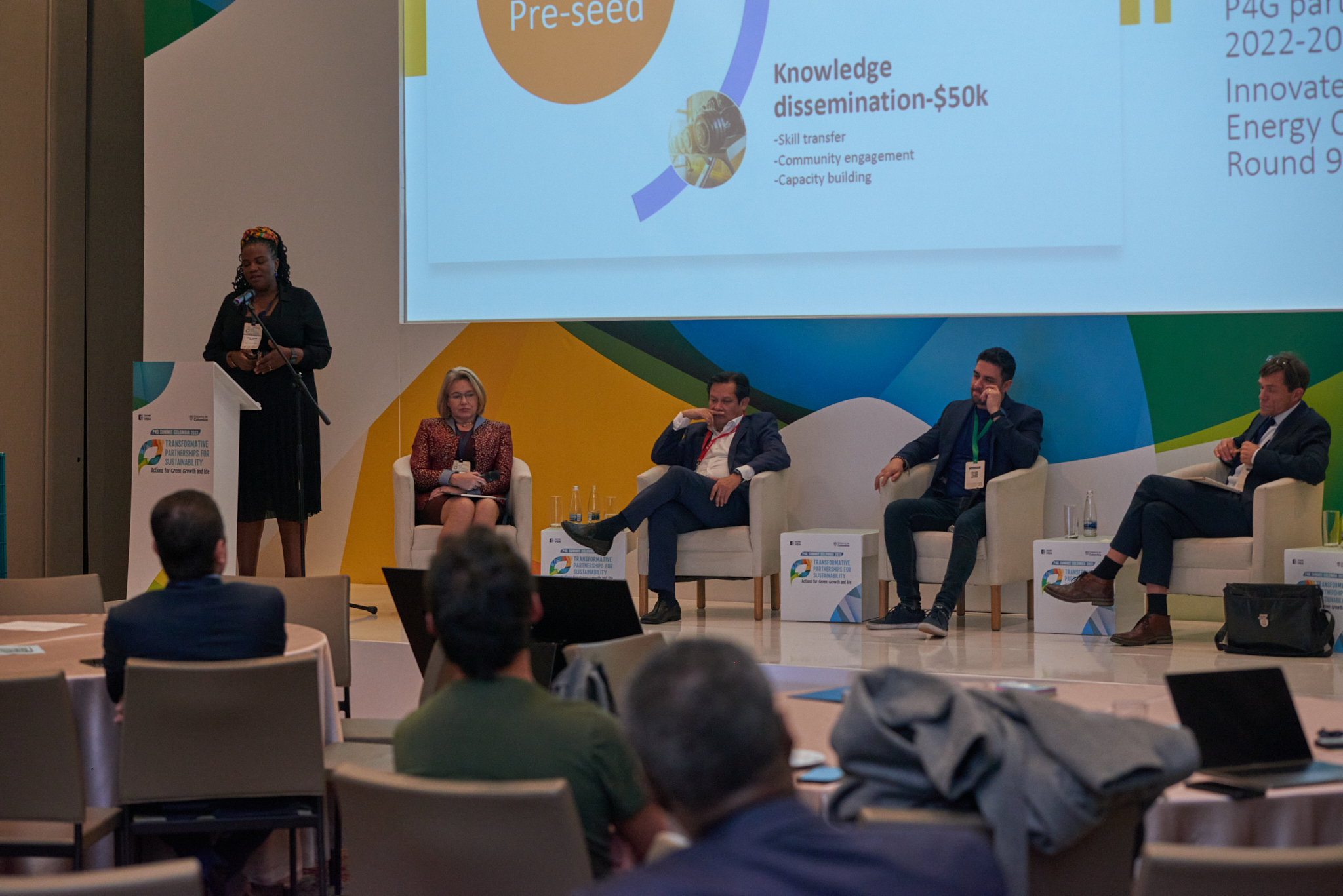
Subject
P4G Summit
Country
Republic of Colombia, Ethiopia, Vietnam, Indonesia, South Africa, Kenya
Publication Date
2023-10-04
About
9 businesses pitched their business models to investors and key stakeholders in the climate impact ecosystem at the 2023 P4G Colombia Summit and shone a spotlight on concrete investable solutions, their challenges and plans for scaling. The P4G Summit had a sharp focus on channeling climate finance to low- and middle-income countries and the financial mechanisms and enabling environment required to support climate businesses.
These pitch sessions gave climate businesses an avenue to receive constructive feedback for improvement and build long-term relationships with prospective investors. The pitch sessions were divided across the three Summit tracks of Biodiversity, Energy Transition and Sustainable Cities.
Judges who provided feedback during the sessions included Gideon Blauww, General Director, Clean Teach Hub Colombia; Wonyoung Kim, Executive Director, Crevisse Partners; Isabelle Foster, WWF Impact, World Wildlife Fund (WWF); Jaswinder Bedi, General Director, Bedi Investments and Chairperson, Kenya Private Sector Alliance; Pham Duy, Head of Investment, National Startup Support Center of Vietnam; Jenitha Badul, Senior Advisor, Department of Environment, South Africa; Clemente Del Valle, Director, Financial Sustainability Center, Universidad de los Andes; Sergio Zuñiga, Director of the Entrepreneurship and Innovation Center, Chamber of Commerce, Cali; and Morten Elkjaer, Senior Vice President, Investment Fund for Developing Countries (IFU)
Biodiversity
Transforming Africa’s Bamboo is a P4G partnership that uses native bamboo in Ethiopia to make durable construction materials such as frames for dry walls. African Bamboo, the business partner in the partnership, uses an intensified manufacturing process that halves processing time, cuts energy consumption by more than 30%, and reduces costs by more than 61%, while producing a material that is two times stronger than steel. The company has a competitive advantage because of its focus on biodiversity and climate change. It has created a value of €47.7 million to date with 100% offtake from SECA, a family-owned Austrian business that is one of the leading wood industry companies in Europe.
Terrasos is a Colombian company that specializes in the structuring and operation of environmental investments. It designs biodiversity banks to offset environmental impacts. These are management mechanisms to restore, create or compensate for the ecological impact of development projects. The company focuses on highly threatened ecosystems with high biodiversity. It establishes conservation and restoration areas and companies purchase biodiversity offset credits from it. The company conducts a rigorous due diligence process to estimate the number of available credits and uses an independent third-party expert for monitoring.
Bioingred is a company providing natural and sustainable ingredients for the food and cosmetic industry. It has a portfolio of natural products for oils, food and dietary supplements. It is working with 750 farmers and sells ingredients to local markets in Colombia and international markets such as Australia and Italy. The business has reforestation projects to support communities and promotes direct purchasing from farmers and farmer associations to improve livelihoods. The funding requirement for their ongoing funding round stands at approximately US $3.25 million.
Energy Transition
Digitizing Energy optimizes household energy appliances for consumers and the grid through an automated smart energy management system. Village Energy is the commercial partner in the partnership. Through a digital platform, it connects household energy appliances to the grid and helps utilities manage the energy according to demand requirements. This allows consumers to manage their energy spend and save money, and it supports utility companies to keep up with energy demand and the transition to zero-carbon grids. The company is looking for an estimated investment of US $4 million to deploy more connections to utility customers, attract new customers and invest in new product development.
SEOS is scaling up a financing platform to encourage the uptake of residential rooftop solar. It provides web and mobile portals and energy smart monitors designed for end users and installers. It offers financing options for solar loans for homeowners and for installers. The business is growing with a monthly increase of 9.4% in customer acquisition. Its focus is to strengthen its presence in Colombia, while also designing an entry plan to Mexico and two other countries in Latin America. It is planning to launch a priced seed investment round in Q1 2024 to raise around US $4 million in equity. In parallel, it is looking to secure senior debt facilities up to US $10 million.
Uptime Analytics was another presenter during this session, showcasing their expertise in optimizing energy consumption and aiding in industrial decarbonization through the use of Artificial Intelligence. Over the past year, they have achieved an impressive fourfold growth in revenues and successfully completed their pre-seed stage in 2022, with EPM in Medellin as one of their prominent investors. Looking ahead, in line with their expansion plans involving both existing and prospective clients, they are gearing up to launch a new investment round in early 2024.
Sustainable Cities
Building Circular Food Systems uses insects to convert organic food waste into high quality animal feed and fertilizer. Chanzi is the commercial partner in the partnership. A single Chanzi facility has the capacity to process more than 25 metric tons of waste per day, offset 9.2 metric tons of carbon every day and benefit more than 2,800 smallholder farmers. In 2023, Chanzi has managed more than 3,000 metric tons of waste. It currently operates in Tanzania and Kenya with a new facility coming up in South Africa. The long-term vision is to have 47 operational facilities by 2028 for which it needs an estimated capital raise of US $17 million. This will allow Chanzi to process 2,000 metric tons of waste per day, hire 10,000 direct and indirect staff, and offset 250,000 metric tons of carbon annually.
SUN RUN is bringing the e-mobility transformation to rural Kenya with a focus on gender inclusivity. E-Safiri and Kiri EV are the commercial partners in this partnership. Sun Run will build local capacity to maintain electric vehicles and lease the vehicles through pay-as-you-go (PayGo. The vehicles will be charged at solar powered battery charging stations with the extra power serving other businesses. Sun Run plans on increasing the number of vehicles and charging hubs. Sun Run works in collaboration with Kiri EV, which focuses on the Business to Business side of the market, last mile delivery and corporate fleets. Kiri EV assembles the e-motorcycles with revenue coming from bike sales, leases and spare parts and servicing. It is currently raising US $1.5 million in seed financing and is targeting US $5 million for its next raise.
Digital Food Rescue Ecosystem is a digital platform that automates the food rescue process and connects the industry with food banks to reduce waste and combat hunger. EatCloud, the commercial partner, operates in Colombia and Mexico. Not only does it optimize the pick-up of surplus food from the food industry, but also through analytics optimizes the most efficient routes to pick up and deliver the food. EatCloud has a subscription-based model with two charge fees, one for the automation platform and the other for analytical data collected. It has redistributed 70 million dishes of food, mitigated 20,000 tons of carbon emissions and saved businesses US $30 million. It is currently seeking US $2 million in pre-Series A funding to consolidate and expand the business in Colombia, Mexico and Spain.
How Nature-Based Solutions are Protecting Biodiversity
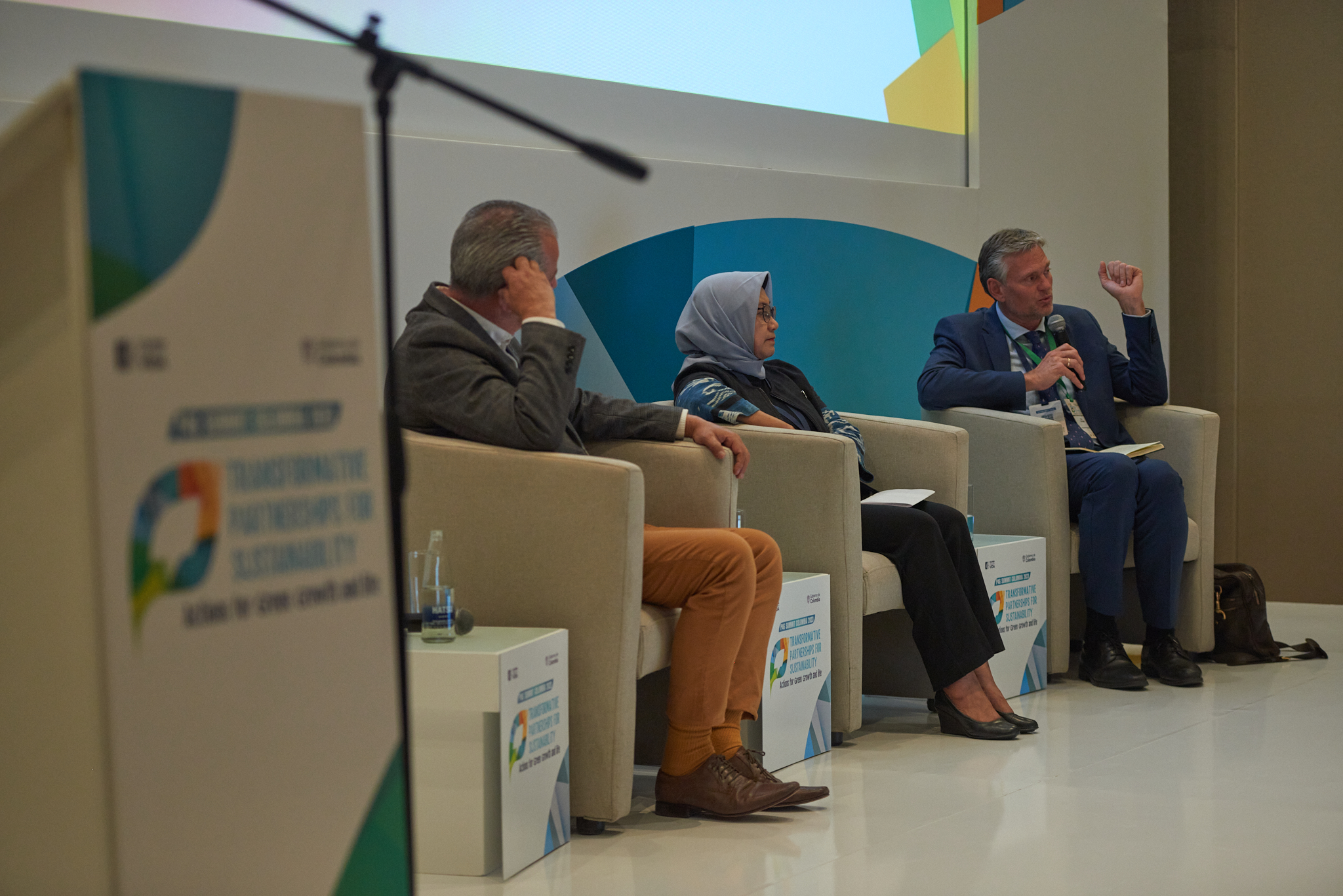
Subject
P4G Summit
Publication Date
2023-10-03
About
“We need more collaboration on what actually works. What solutions can be implemented on the ground to get that ecosystem of knowledge out there,” said Ole Thonke, Vice Minister and Undersecretary for Development Policy, Denmark to kick off the Biodiversity track at the P4G 2023 Colombia Summit. Valuing and protecting biodiversity as a key stalwart against climate change echoed throughout Summit conversations.
During the biodiversity opening remarks, Vivi Yulasawti, Deputy Minister of Maritime Affairs and Natural Resources in Indonesia, shared how her country has worked to identify the main issues and challenges facing biodiversity and is now in the process of enabling a regulatory framework to resolve them. They are developing an Indonesian Biodiversity Strategy and Action Plan to serve as a reference for strategic policies including an integrated system for business permit mechanisms. This requires private sector collaboration on digital technology and information. Yulaswati emphasized the importance of keeping up momentum to ensure implementation of the global biodiversity framework.
Thonke noted that biodiversity is a big priority for Denmark, as restoring ecosystems would contribute tremendously to reducing carbon dioxide emissions globally. Rodrigo Ravena, Secretary of Environment for Sao Paulo, Brazil shared the city’s approach to valuing and preserving biodiversity despite its large population. All speakers emphasized the need to closely link biodiversity and nature-based solutions to climate change.
At the panel session on Land Restoration and Nature-based Solutions, panelists discussed opportunities to forge partnerships and overcome barriers between stakeholders who have different legitimate interests and who seek different objectives. The session underscored the need for accountability, something that wasn’t always clear as different authorities work in siloes making it difficult to understand who is leading the issue. Moderated by Pablo Martinez, Country Representative for the Global Green Growth Institute, the key question posed to panelists was - “What do we need to make a successful model?”
Cristian Zamora, Mayor of Cuenca, Ecuador, illustrated the importance of financing through payment for environmental services. However, he cautioned that voluntary schemes, where companies can choose credits based on supply and demand, must be better defined and managed to make them effective. He also reiterated the opportunity to make people care about biodiversity through powerful images of animals which makes the issue seem more tangible, but admitted that monetizing environmental activities remains challenging.
Adriana Lobo, Managing Director, Global Presence and National Action at World Resources Institute noted the need to find a balance between the interests of all stakeholders. She also outlined the technical challenges, which include defining land ownership, accessing capital and markets, and combining equity loans and grants in a single vehicle. This challenge is compounded by the lack of understanding of how to transact equity or grants across borders. Along with financing, Lobo urged stakeholders to consider how to improve training capacity and aggregate land ownership.
Panelists including Wonyoung Kim, Executive Director, Crevisse Partners shared some of the technical challenges and need to find solutions where people can live in urban areas without destroying nature. Speakers also emphasized the contribution investors can make, including talent development and helping businesses with strategic decision making. Most importantly, they noted we must trust experts to find good nature-based solutions in pursuit of an ambitious vision for restoration.
In the fireside chat on Deforestation and Biodiversity Loss, Fernando Paez, Deputy Director, WRI Colombia moderated a discussion between Alejandro Gutiérrez, Sustainability Manager at Natura and Wubie Mengestu, Secretary General of the Ethiopia Chamber of Commerce and Sectoral Associations, which explored the role of the private sector in shifting demand from unsustainable practices. Both speakers offered examples of solutions that are reducing deforestation through viable business models.
How to Accelerate Climate Businesses and Share Learning
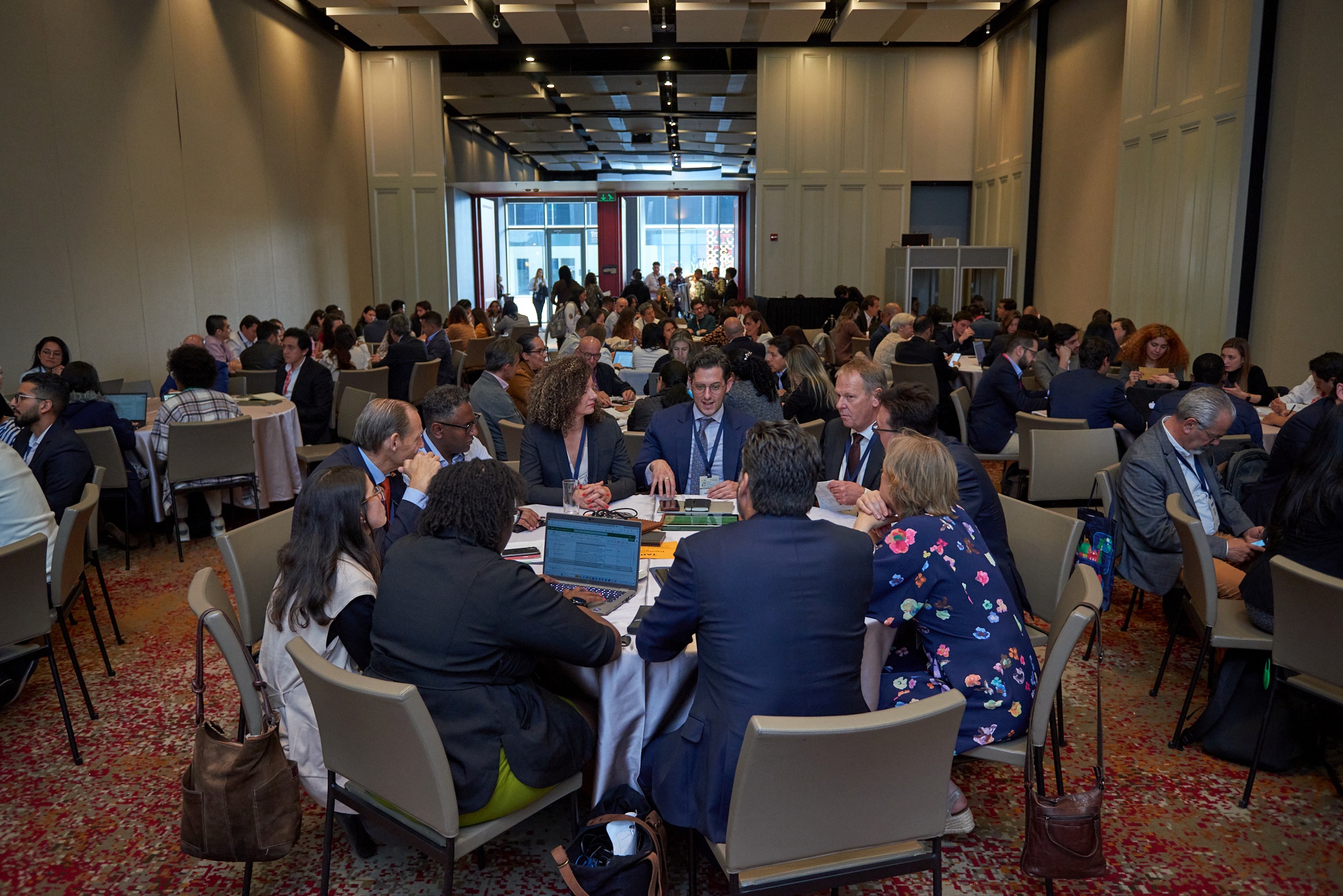
Subject
P4G Summit
Publication Date
2023-10-03
About
A defining feature of the 2023 P4G Colombia Summit was the focus on accelerating early-stage climate businesses in low- and middle-income countries. The Summit included acceleration roundtables, where 34 P4G partnerships and Colombian businesses shared their business model, results and challenges with government representatives and investors from across different industries who provided suggestions and lessons learned to strengthen their model. The tables were divided across the three main Summit tracks and included some of the following exchanges.
Biodiversity
Transforming Africa’s Bamboo, which is using native bamboo in Ethiopia to make sustainable building materials, shared its approach to capturing data and measuring different impact indicators, such as soil quality for biodiversity. The partnership described its challenges with delayed financial returns, in part due to the time it takes to grow bamboo. It is trying to address this by setting up community forests alongside coffee farming or with other compatible trees. The partnership also emphasized the need for support on getting investment ready and better understanding biodiversity credits. Experts at the table shared potential learnings from using Artificial Intelligence in Vietnam or pursuing different climate finance facilities.
Highlighting its work across Tanzania, Kenya and South Africa, Building Circular Food Systems shared how it is solving waste challenges by converting waste into organic proteins using organic larvae, or maggots. It has developed an effective waste aggregation system, constructed a new facility in Nairobi and has plans underway for a facility in South Africa. The partnership’s challenges include securing enough space to collect community waste alongside the waste from fast moving consumer goods companies. Since it’s developed a specific product relevant to African markets, it also needs investors who understand and actively support the business. Experts from Kenya and South Africa shared suggestions on collaborating with local and municipal governments to secure landfill space and offered to connect the partnership with additional corporate partners to develop long-term relationships that can continue to solve future waste problems.
Energy Transition
P4G’s Green Last Mile partnership highlighted its work on using electric three-wheelers for zero-carbon last mile delivery services in Bogota and its challenge with regulation not recognizing three-wheelers as delivery providers. Experts from Kenya, a country leading on electric-mobility, discussed how government can support effective regulation as Kenya is doing through its e-mobility commission that has incorporated policy recommendations from P4G pilot partnerships. At the same time, Kenyan partners learned how they might be able to replicate electric last mile delivery in Nairobi.
With Vietnam as the world’s third largest cement producer, Greening Cement aims to use waste as an alternative fuel to decarbonize cement production. However, it is struggling with securing enough waste supply to make the technology cost-effective. This requires collaboration with local government to ensure enough waste and overcome legal barriers to cooperate around collection and sorting. That’s why the partnership organized a workshop focused on brainstorming solutions for removing barriers, and worked with P4G to connect with new financial actors who can accelerate and expand the business model. With Colombian government and private sector partners at the table, they discussed strategies for mixing waste and better clarifying the feasibility results.
P4G partnership Sun Run, which is bringing the e-mobility transformation to rural Kenya with a focus on gender inclusivity and Zero Emission Bus Rapid-deployment Accelerator (ZEBRA), which supports cities to expand their electric bus fleets by helping them establish procurement pipelines and financing mechanisms for e-buses also presented during the session.
Sustainable Cities
In the sustainable cities track, businesses working on water supply, reducing food loss and circular economy shared their approach.
Closing the Loop on Textile Waste works on recycling clothing waste into new fabrics in Kenya and Bangladesh. For Kenya, it shared its challenges on making the approach more effective by locating it within special economic zones, where it would have easier access to the waste. With stakeholders from the Kenya Private Sector Alliance (KEPSA), the partnership identified potential collaboration opportunities for securing more access to waste. Meanwhile in Bangladesh, the partnership outlined the need and opportunity to benefit from exporting its textile waste.
The acceleration sessions also sparked partnership to partnership learning. Recycle 2 Value presented how it plans to process mixed plastic waste into recyclable building materials in Indonesia. Meanwhile, Circular Waste Centers, working on hazardous waste in Colombia, was curious to learn how Recycle 2 Value secures buyers and its experience with local demand. Currently, Recycle 2 Value sells its products to the Netherlands, as Indonesia still struggles to see recycled materials as appealing. Circular Waste Centers noted a similar challenge in convincing end users of the value of paying to convert waste to energy, as they exchanged ideas for how to increase local demand. Participants at the table also discussed the potential to scale as long as local partners operate the technology.
Circular Waste Centers also had its own acceleration table, where it shared its challenges in making the business model financially feasible due to the lack of incentives for proper waste segregation and lack of adherence or monitoring of the law. Currently, it is more attractive for investors to take waste to the landfill - landfill managers receive around $8 - $10 for 1 ton of waste disposed, and in Bogota there are 5,000 tons of waste generated a day. Indonesia also struggles with the same problem of it being cheaper to send waste to the landfill and the lack of guarantee about having a consistent amount of waste supply to convert to energy. Meanwhile, Vietnam struggles with the opposite problem – the Greening Cement partnership can’t secure enough waste. Participants at the table scheduled follow-up conversations to continue the discussion and learn from each other.
Other P4G partnerships in the session included Building Efficiency Accelerator and Smart Waste Collective.
Click here to learn more about all of P4G’s partnerships.
Here’s How to Build Sustainable and Circular Cities
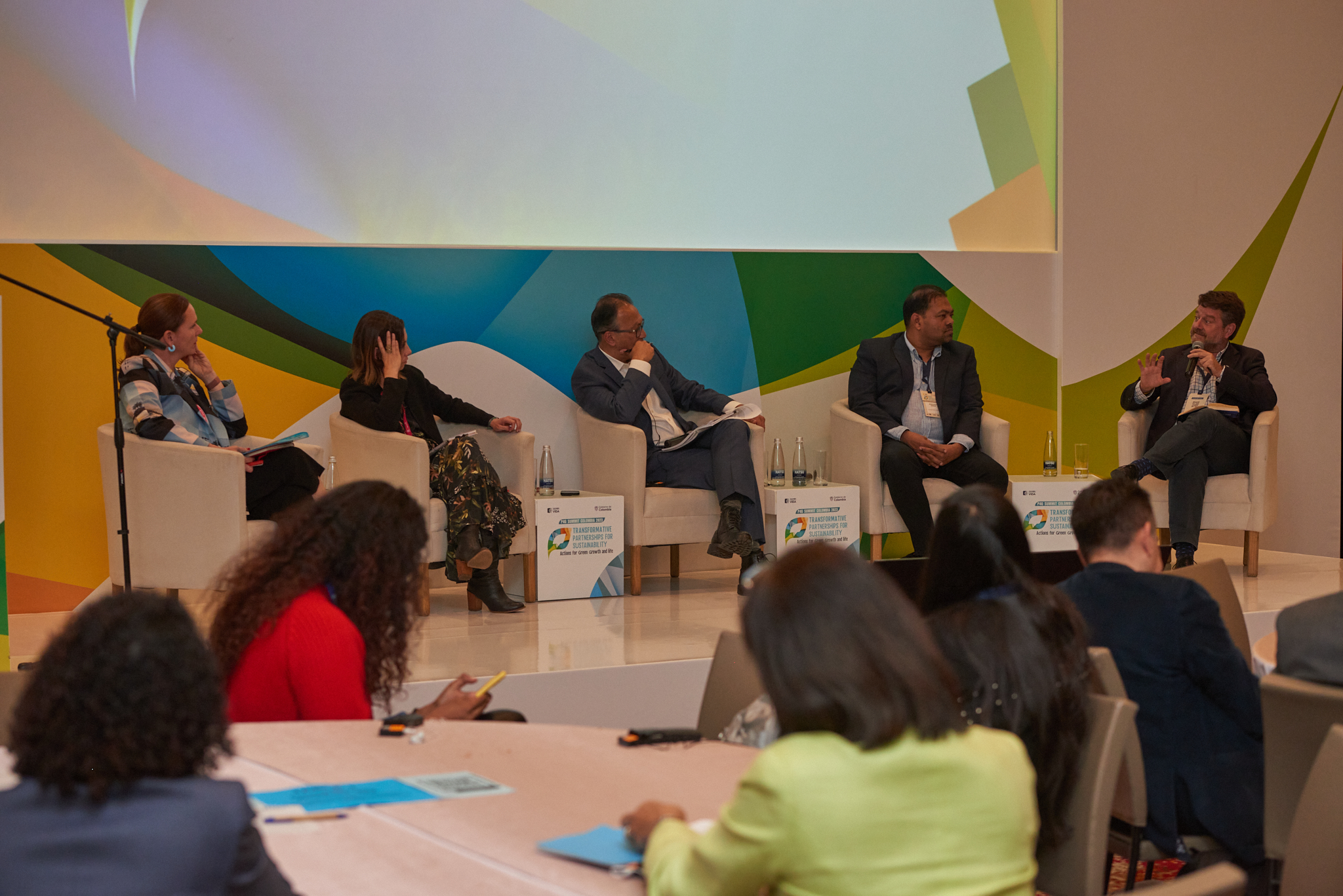
Subject
P4G Summit
Country
Publication Date
2023-10-03
Partnership
About
Cities have tremendous opportunities to lead innovation and provide funding solutions to climate challenges. But they need to enable specific levers of change that can help them meet their goals.
Speakers at the 2023 P4G Colombia Summit panel discussion on building Sustainable and Circular Cities shared their solutions and strategies to enable circularity principles and businesses to flourish.
Carolina Urrutia, Secretary of Environment of Bogota, Colombia kicked off the discussion by dismantling the myth that the public and private sector are at loggerheads with each other. Instead, she said, “people want to work together,” and what’s required is more honesty and realism about what needs to be accomplished. The wide-ranging session touched upon opportunities and solutions the panelists were excited about and the continued barriers to achieving circularity.
Claudio Orrego, Governor of Santiago de Chile Metropolitan Region highlighted the immense opportunity brought about by converging policies, where policies fit several goals simultaneously instead of taking a linear and siloed approach to developing regulations.
Cost-efficient waste collection and management systems were top of mind for Mónica Villegas, Manager, Visión 30/30 at ANDI, a private sector initiative to reduce plastic packaging in the national marketplace and achieve circular economy goals. From better collection centers for beaches to implementing programs in restaurants to collect organic waste, she described the initiative’s programs for rethinking waste management and transforming waste collection in remote regions.
Mostafiz Uddin spoke about the exciting developments in sustainable fashion from his vantage point as the founder and CEO of Bangladesh Apparel Exchange, a denim manufacturing company and initiative to promote circular fashion in Bangladesh. He recalled how in 2017, people couldn’t even pronounce circular fashion. Fast forward 6 years later, and Bangladesh is now setting examples for sustainable garment manufacturing. He called out of the work of P4G partnership “Closing the Loop on Textile Waste” that is maximizing the amount of fabric waste recycled to like-new quality fiber in Bangladesh.
Ever the pragmatist, Uddin also underscored that the private sector is driven by profit and that “there has to be a business case” for any solution to be championed.
When the conversation turned to challenges, panelists shared a number of them. Lack of knowledge was one common barrier that seemed to rise across countries. Speakers shared the huge challenge of building capacity and a general need for more awareness of any new environment program.
Orrego shared how in Santiago they request that at least 5- 10% of the budgets in environmental programs be devoted to awareness campaigns.
“Sometimes we frame policies in a bad way,” Orrego said, as he explained that they’re not asking people to give up owning cars, but rather to change the way they use their cars. He used that example to show the importance of framing policies in a way that will change public acceptance of them. He also shared the challenge of institutional accountability and not knowing who is accountable to the public.
Speakers also listed the challenges of existing tariff systems, the lack of enabling regulatory frameworks and financial support.
Ani Dasgupta, President & CEO of World Resources Institute moderated the panel and reflected on the importance of interconnected approaches that look at systems change. He also spoke about the importance of helping businesses understand the environmental change that needs to happen and asked the panelists for their top recommendations for small businesses.
The answers came fast and furious:
• Take the time to build trust and overcome implicit biases.
• Promote the need for social sustainability and acceptance of businesses by showing people that just transitions are linked to environmental justice and business innovation.
And perhaps most importantly, the people-centric message from Uddin who reminded small businesses that people are their biggest asset and asked them to, “Love your people, teach your people, educate your people and believe in your people."
Transportation Decarbonization and Green Hydrogen Key Topics at P4G Summit Sessions on the Energy Transition

Subject
P4G Summit
Country
Publication Date
2023-10-02
About
Energy sources are shifting in countries all around the world. From electric vehicles to developing green hydrogen corridors, the private sector is leading the charge on innovative solutions to meet renewable energy needs. Governments need to provide clear and consistent signals that they will support this change and that there will be a huge market for clean energy.
Speakers in the energy transition sessions at the 2023 P4G Colombia Summit shared ambitions, solutions and successful strategies for how they were accelerating the energy transition from a policy and business perspective.
Felipe Salgado, Partner-Director, KPMG set the context at a panel discussion on decarbonizing transport by sharing background on how the transport sector contributes to one-fifth of global carbon emissions and the majority of governments have not clear set dates for banning internal combustion engines.
“We need to think differently,” he said to overcome the various challenges associated with decarbonizing the transport sector such as addressing the high upfront costs of electric vehicles, increasing the demand for batteries, and being able to meet this demand.
Advocating for city-led change, Andrea Bizberg, Air Quality Expert, C40 Cities, spoke about need to diversify financing options and noted that public-private partnerships are important for commercial banks to provide finance. She spoke about the growing societal pressure for better air quality and need to focus on the climate impact on health.
Inkeun Lee, Director General for Environment & Energy Bureau, Seoul Metropolitan Government, Republic of Korea also came from the angle of city leadership and underscored the need for infrastructure in cities instead of only subsidies for vehicles. He shared Seoul’s strategies for increasing the uptake of electric mobility that includes a focus on subsidies for public vehicles traveling longer distances, spending on fast charges and discounted fare cards for public transport to encourage the use of buses and reduce emissions. Lee also spoke about the Republic of Korea’s investment in green hydrogen to decarbonize the sector.
Hyoeun Jenny Kim, Ambassador and Deputy Minister for Climate Change, Republic of Korea shared how major Korean companies such as Hyundai Motors are aggressively investing in green hydrogen. She emphasized the role of the government in promoting this shift by providing support for research and development, and a regulatory framework to make the sector commercially viable.
The role of governments in supporting the green corridor model was another topic of conversation in a fireside chat on renewable energy and green hydrogen. The term refers to specific routes between two ports where zero emission shipping solutions are supported and demonstrated. Policymakers can put enabling systems with targeted regulatory and financial incentives in place along these corridors.
Ingrid Sidenvall Jegou, Project Director, The Global Maritime Forum shared how this model is gaining traction internationally with 22 governments coming together to make this a reality and 30 green corridor projects announced since 2021. Ambassador Kim mentioned that the Republic of Korea was one of the few countries with a dedicated ministry for maritime and ocean affairs and highlighted the country’s agreement with the United States of America to create a green shipping corridor.
When it comes to the energy transition, private sector engagement is key and business leaders such as Samira Fadul, Corporate Affairs Vice President, Bavaria advocated for more robust incentive schemes. She shared their experience as a P4G partnership working on electrifying their truck fleet and how P4G helped them with financing from a Colombian bank. She spoke candidly about how without charging infrastructure, the process of electrifying trucks was futile.
Carlos Naranjo, Founding Partner and Sustainable Relations Director, Gaia shared that for Colombia to meet its ambitious zero emissions targets there needs to be more action on finance and tax incentives. He also mentioned the collaborative effort between the private and public sector to meet these targets.
Nguyen Thanh Cong, Deputy Head, Ministry of Natural Resources and Environment, Vietnam spoke about Vietnam’s ambitious climate targets and its place as the third country to implement a Just Energy Transition plan after South Africa and Indonesia. He explained how the ministry set internal implementation targets to meet the country’s zero emissions goals.
There was an overarching consensus on the need for collaboration between the public and private sector to make the energy transition a reality and the need for “out-of-the-box” innovative thinking. To achieve net zero by 2050, panelists shared that everyone also bears the responsibility to rethink and change how and what they consume.
P4G Summit Explores Innovative Climate Financing Mechanisms
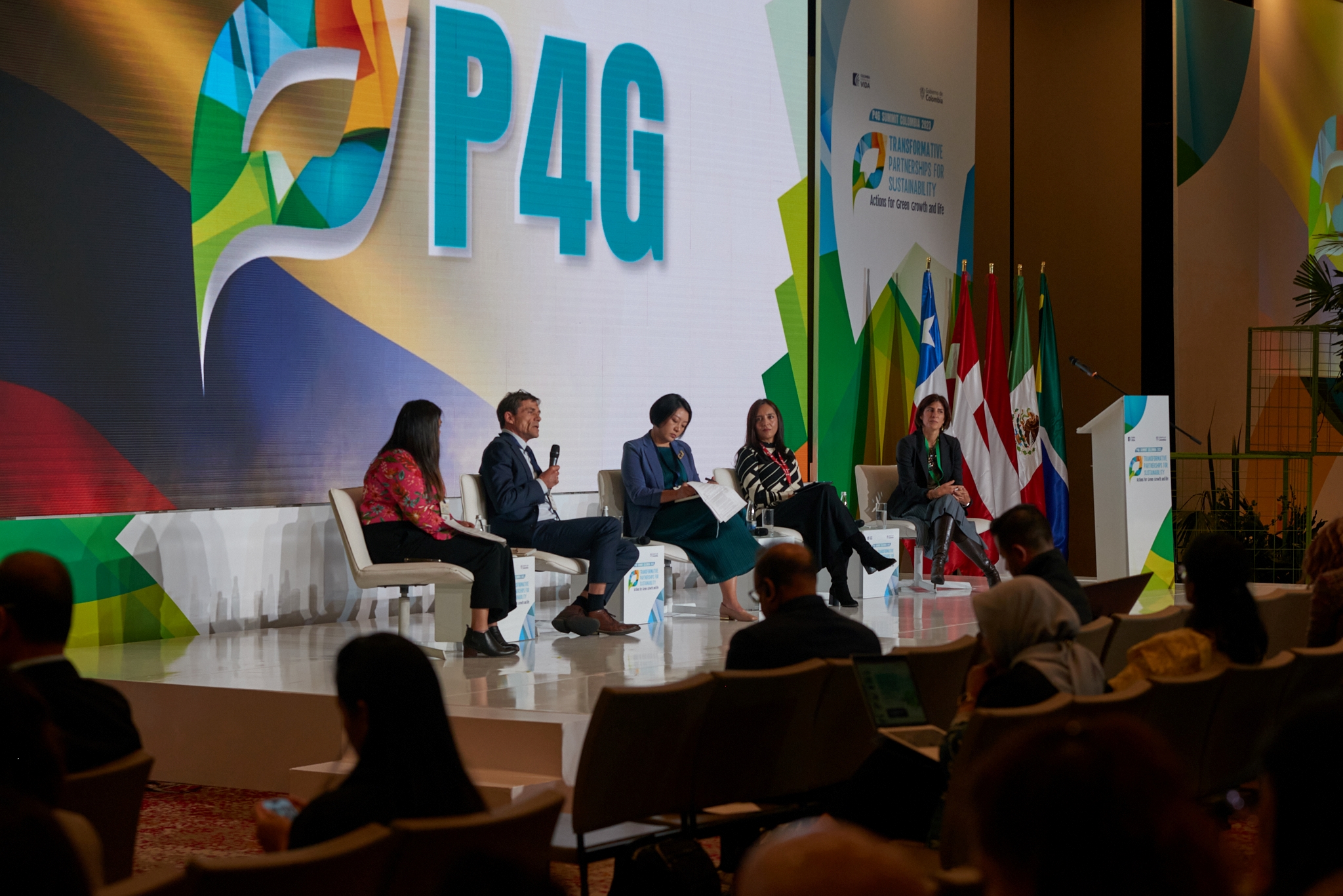
About
“The solution lies with the entrepreneurs. For the future of the planet, the solutions are here,” said Alejandra Botero Barco at the 2023 P4G Colombia Summit High-Level Panel on Innovative Climate Finance. Botero, Manager at the Planning and Impact Development for CAF, the Latin American Development Bank, came together with other key stakeholders funding green solutions to discuss how to increase funding access for those who need it most.
Paola Garcia, Executive Director of ColCapital, kicked off the session emphasizing the need for the private sector to prioritize environmental social and governance (ESG) at the core of any investment. Without ESG principles incorporated and measured, entrepreneurs will not be able to get financing. Garcia also focused on the importance of the private sector and government working together. She shared the example from Colombia where the government established a legal framework that provided incentives for companies to transition to non-conventional renewable energy, thus bolstering the transition.
In his intervention, Morten Elkjaer, Senior Vice President of the Danish Investment Fund for Developing Countries (IFU) shared how IFU is looking to establish good relationships at the country level because local anchoring ensures that funding goes where it is needed the most. “We need to have a strong foundation, or we will never be able to ensure that funding is applied best. We need this local anchoring to contribute to climate goals and look at social inclusion.” Elkjaer also highlighted the need to ensure investments have a reasonable chance of becoming profitable because that’s the only way they will continue to implement and mobilize private sector over time.
Bringing in the local and regional government perspective, Cristina Argudo, Deputy Director for Latin America at C40 Cities, underscored the importance of ensuring innovative climate financing mechanisms must also be accessible to cities. She shared an example from Bogota where small subsidies to promote technological changes from diesel to more environmentally friendly trucks also included training for the drivers. These projects must be clear on the benefits and job creation to ensure an inclusive, just transition. Argudo notes that cities are very interested in leading with examples and they rely on different partnerships to do so.
Botero emphasized the need for urgent action throughout her remarks. Globally, only 15% of the SDGS are on track to be met, but none are on track in Latin America and the Caribbean. She noted this challenge is one of the reasons why CAF has made a commitment at an institutional level to fund 40% of green projects by 2026. With this ambitious commitment, Botero remarked that they can’t just impose this agenda, but have to do so hand-in-hand with affected communities. CAF wants to be seen as an ally for seeking out and de-risking projects, such as those on green energy or sustainable agriculture. Botero also urged attendees to reconsider how they measure project impact – rather than looking solely at dollars, measurements should also include how many places are protected or how many families are helped.
Moderated by Shuang Liu, Interim Global Director of the Finance Center at WRI, the panel included discussions of financing mechanisms, such as green bonds, guarantees and other measures that can help bridge the financing gap. To close the session, panelists were asked what advice they’d give the entrepreneurs in the audience. Botero encouraged them to look at both traditional and non-traditional sources of financing. With entrepreneurs as the pioneers in changing the paradigm, Argudo noted that even if conditions aren’t perfect, taking the first step is the best way to get the word out there. Garcia encouraged entrepreneurs to pursue solutions that can be scalable, while Elkjaer urged them to be transparent as well.
As Garcia put it, “We can’t keep living as two worlds apart. We need to see results and the only way to see results is working together as a team.”
